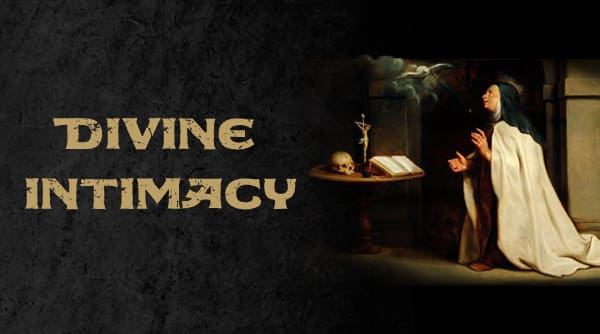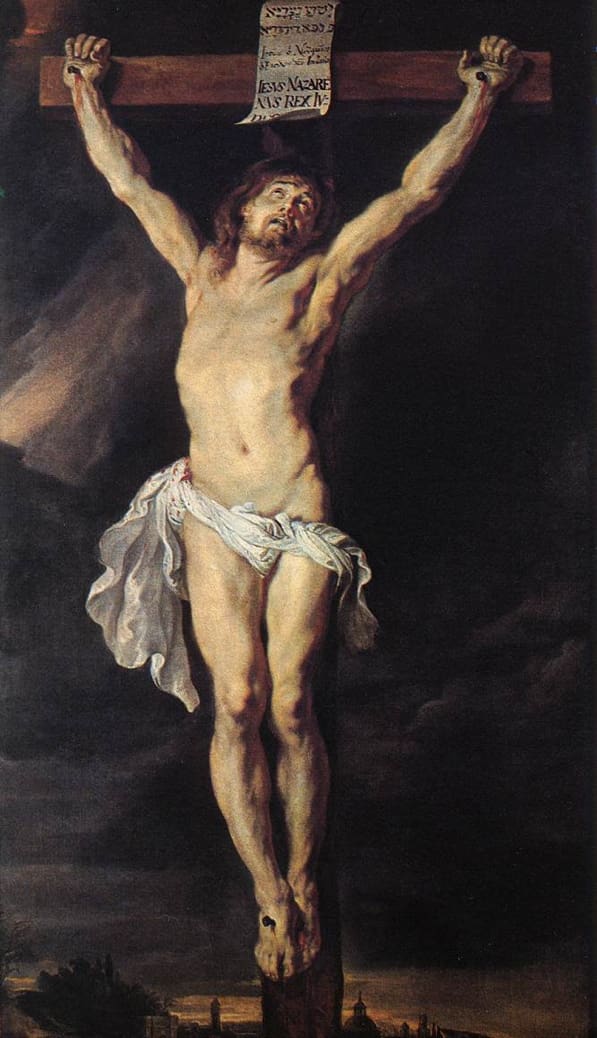Good Friday
The Mystery of the Cross
Presence of God – O Jesus, permit me to penetrate with You into the depths of the mystery of the Cross.
MEDITATION
Good Friday is the day which invites us more than any other to “enter into the thicket of the trials and pains … of the Son of God” (John of the Cross, Spiritual Canticle first redaction, 35,9), and not only with the abstract consideration of the mind, but also with the practical disposition of the will to accept suffering voluntarily, in order to unite and assimilate ourselves to the Crucified. By suffering with Him, we shall understand His sufferings better and have a better comprehension of His love for us, for “the purest suffering brings with it the most intimate and the purest understanding” (ibid., 36,12); and “no one feels more deeply in his heart the Passion of Christ than one who has suffered something similar” (Thomas à Kempis, Imitation of Christ, Book II, Chapter 12, Paragraph 4). With these dispositions let us accompany our Lord during His last day on earth.
The atrocious martyrdom, which within a few hours will torture His body, has not yet begun, and yet the agony of Jesus in the Garden of Olives marks one of the most  sorrowful moments of His Passion, one which best reveals the bitter sufferings of His soul. His most sacred soul finds itself immersed in inexpressible anguish; it is extreme abandonment and desolation, without the slightest consolation, either from God or from man. The Savior feels the weight of the enormous burden of all the sins of mankind; He, the Innocent One, sees Himself covered with the most execrable crimes, and made, as it were, the enemy of God and the target of the infinite justice which will punish all our wickedness in Him. Of course, as God, Jesus never ceased, even in the most painful moments of His Passion, to be united to His Father; but as man, He felt Himself rejected by Him, “struck by God and afflicted” (Isaiah 53:4). This explains the utter anguish of His spirit, much more sorrowful than the dreadful physical sufferings which await Him; explains the cruel agony which made Him sweat blood; explains His complaint, “My soul is sorrowful even unto death” (Mt 26:38). Whereas before He had so ardently desired His Passion, now that His humanity finds itself facing the hard reality of the fact, deprived of the sensible help of the divinity, which seems not only to withdraw but even more, to be angry with Him, Jesus groans: “My Father, if it be possible, let this chalice pass from Me!” But this anguished cry of human nature is immediately lost in that of the perfect conformity of Christ’s will to the Father’s: “Nevertheless not as I will, but as thou wilt” (Mt 26:39).
sorrowful moments of His Passion, one which best reveals the bitter sufferings of His soul. His most sacred soul finds itself immersed in inexpressible anguish; it is extreme abandonment and desolation, without the slightest consolation, either from God or from man. The Savior feels the weight of the enormous burden of all the sins of mankind; He, the Innocent One, sees Himself covered with the most execrable crimes, and made, as it were, the enemy of God and the target of the infinite justice which will punish all our wickedness in Him. Of course, as God, Jesus never ceased, even in the most painful moments of His Passion, to be united to His Father; but as man, He felt Himself rejected by Him, “struck by God and afflicted” (Isaiah 53:4). This explains the utter anguish of His spirit, much more sorrowful than the dreadful physical sufferings which await Him; explains the cruel agony which made Him sweat blood; explains His complaint, “My soul is sorrowful even unto death” (Mt 26:38). Whereas before He had so ardently desired His Passion, now that His humanity finds itself facing the hard reality of the fact, deprived of the sensible help of the divinity, which seems not only to withdraw but even more, to be angry with Him, Jesus groans: “My Father, if it be possible, let this chalice pass from Me!” But this anguished cry of human nature is immediately lost in that of the perfect conformity of Christ’s will to the Father’s: “Nevertheless not as I will, but as thou wilt” (Mt 26:39).
COLLOQUY
“O Christ, Son of God, as I contemplate the great sufferings You endured for us on the Cross, I hear You saying to my soul: ‘It is not in jest that I have loved you!’ These words open my eyes, and I see clearly all that Your love has made You do for me. I see that You suffered during Your life and death, O Man-God, suffered because of that profound, ineffable love. No, O Lord, it was not in jest that You loved me, but Your love is perfect and real. In myself, I see the opposite, for my love is lukewarm and untrue, and this grieves me very much.
“O Master, You did not love me in jest; I, a sinner, on the contrary, have never loved You except imperfectly. I have never wanted to hear about the sufferings You endured on the Cross, and thus I have served You carelessly and unfaithfully.
“Your love, O my God, arouses in me an ardent desire to avoid anything that might offend You, to embrace the grief and contempt that You bore, to keep continually in mind Your Passion and death, in which our true salvation and our life are found.
“O Lord, Master, and eternal Physician, You freely offer us Your Blood as the cure for our souls, and although You paid for it with Your Passion and death on the Cross, it costs me nothing, save only the willingness to receive it. When I ask for it, You give it to me immediately and heal all my infirmities. My God, since You agreed to free me and to heal me on the one condition that I show You, with tears of sorrow, my faults and weaknesses; since, O Lord, my soul is sick, I bring to You all my sins and misfortunes. There is no sin, no weakness of soul or mind for which You do not have an adequate remedy, purchased by Your death.
“All my salvation and joy are in You, O Crucified Christ, and in whatever state I happen to be, I shall never take my eyes away from Your Cross” (St. Angela of Foligno).
+
 Note from Dan: These posts are provided courtesy of Baronius Press and contain one of two meditations for the day. If you would like to get the full meditation from one of the best daily meditation works ever compiled, you can learn more here: Divine Intimacy. Please honor those who support us by purchasing and promoting their products.
Note from Dan: These posts are provided courtesy of Baronius Press and contain one of two meditations for the day. If you would like to get the full meditation from one of the best daily meditation works ever compiled, you can learn more here: Divine Intimacy. Please honor those who support us by purchasing and promoting their products.
Art: The Crucified Christ, Peter Paul Rubens, between 1610 and 1611, PD-US; An angel comforting Jesus before his arrest in the Garden of Gethsemane, Carl Heinrich Bloch, 1865-1879, http://freechristimages.org, PD-US copyright expired; both Wikimedia Commons. Father Gabriel of St. Mary Magdalen, mirror from open source material.






